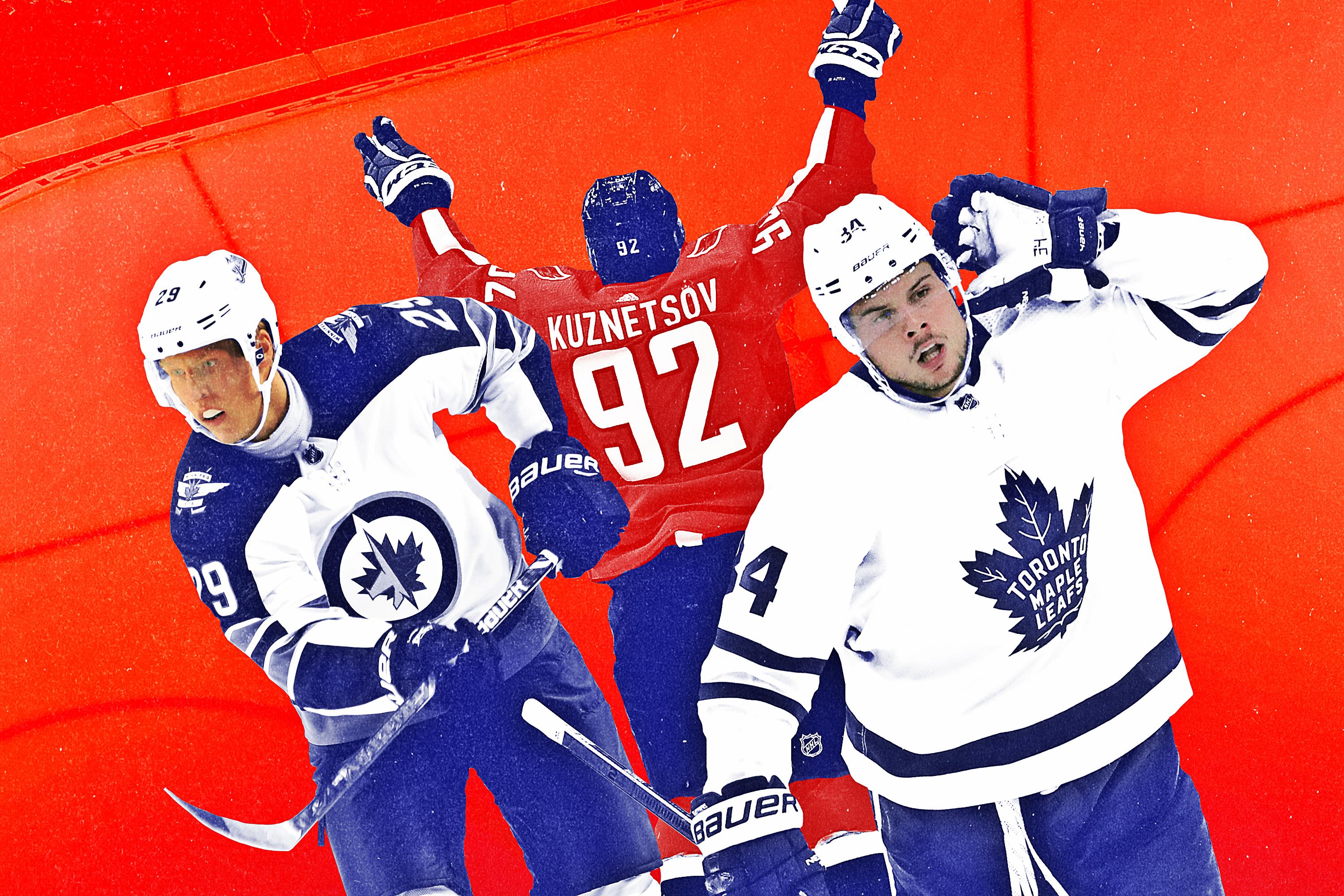
Late in the third period of a free-wheeling, high-flying tilt between the Toronto Maple Leafs and the Chicago Blackhawks this season, Leafs forward Auston Matthews needled the Chicago-centric United Center crowd. Twenty-two seconds earlier, Blackhawks winger Patrick Kane had tied the game, 5-5, sending the notoriously loud building into its typical “Chelsea Dagger”–blaring hysterics. But with 1:02 left on the clock, Matthews responded with his second goal of the night. As the home crowd went silent, he cupped his hand up to his ear and wiggled his fingers, like Hulk Hogan on skates or Phil Kessel in college. The move was low-key audacious, harmlessly obnoxious, and just plain great.
Less than a minute later, Kane tipped another goal into the net, tying the game again at 6-6; in celebration, the three-time Stanley Cup champion smirked and mimicked Matthews’s move. (Sitting on the bench, Matthews could only smile at his worthy adversary.) The Leafs ultimately won the game in overtime—Matthews assisted on the final goal—and for just about everyone other than dour purists, goaltender enthusiasts, and Don Cherry, that back-and-forth in Chicago was a lively glimpse into just how much fun skilled and slightly rude hockey can be.
It wasn’t the first time Matthews, who was picked first overall by Toronto in the 2016 NHL draft, had turned in a captivating performance. In his first NHL game, against the Ottawa Senators, he scored four goals as his mother giggled in disbelief in the stands. Last season, his second, he averaged more than a point per game, was named to the NHL All-Star roster, and earned votes for the Lady Byng Memorial Trophy, which honors sportsmanship and gentlemanly play. This fall, in the span of less than two weeks, the 21-year-old has already recorded 10 goals and added six assists for Toronto. He leads the league in scoring and has grown bold enough to be having some fun on someone else’s ice.
To see a guy like Matthews in full “Are you not entertained?” form a week into the season was to eagerly anticipate where this combination of swagger and talent might take him, and his team, and the league. There was a beautiful “anything you can do I can do better” escalation to all of it, and also an undercurrent of mutual respect. (No faces were punched in the making of these moments, unlike when, say, Lars Eller celebrated the goal that put the Capitals up 7-0 over the Bruins on opening night and Brad Marchand responded by throwing fists and drawing blood.) And he isn’t the only young player for whom that is the case. Little by little, some of the league’s other rising stars have been making important contributions to the sport that can’t be found in a standard box score, or even on one of those hyper-analytic hockey stat sites. Forget normal measures like GWGs or SOG or Corsi, although in the case of someone like Matthews, those are great too. These players have also proved themselves to be current and future league leaders in DGAF.
Last Wednesday night, following Washington’s 5-2 win over the Vegas Golden Knights in a rematch of last season’s Stanley Cup final, Capitals forward T.J. Oshie singled out his teammate Evgeny Kuznetsov for praise, calling him a top-five player in the league. (Kuznetsov had earned the primary assist on three different Washington goals that night.) When a reporter relayed Oshie’s comment to Kuznetsov and asked whether he’s ever contemplated his place within the league, the 26-year-old Russian did not mince words. “I don’t give a shit about that,” he said, gloriously. Kuznetsov went even further that night in another postgame comment, saying his approach to the game is “just about, have fun every night you go out there. If you don’t have fun and you don’t want to enjoy, you shouldn’t be playing hockey. You should be retired.”
This isn’t lip service; Kuznetsov is one of the most unabashedly joyful players in the league, a guy who has spent the past couple of years celebrating goals with a gawky, goofy impression of a bird taking flight. (Kuznetsov has sported other goal celebrations in his career, from pantomiming kayaking, to playing dead, to doing push-ups.) Kuznetsov says his young daughter is a huge fan of the avian extravaganza, a move he ripped straight from the video game FIFA, and she’s not the only child who loves it. During the second intermission of a preseason Caps-Blues contest, in one of those “Mites on Ice” games, a little kid scored a goal, lifted one leg, and serenely flapped his small arms.
The NHL doesn’t so much have a list of unwritten rules as it has a whole dusty library of them. (In some ways, the Dewey Decimal System and the Department of Player Safety serve a similar purpose.) Don’t showboat. Blend in with the boys. Off the ice, keep your head down or risk being labeled as immature and selfish; on the ice, keep your head up or risk being victim-blamed when you catch a high elbow and get concussed. Fighting is technically illegal, wink wink, nudge nudge. Show respect to your elders, know your station, and let your play do all of the talking. Stay away from Fortnite! If you really need to blow off steam, you may mock a player’s time in the minor leagues or engage in an arbitrated dispute that sounds like two tourists fighting over a time-share. None of this is unreasonable or wrong on its face, but after awhile, all of the NHL’s humorless policing has a way of adding up.
Earlier this month, just before the start of the season, Winnipeg Jets forward Patrik Laine—who was drafted second overall in 2016 behind Matthews and scored 80 goals over the course of his first two NHL seasons—delivered some mild shade toward another Canadian-based team. Responding to reports that the rudderless Vancouver Canucks had decided to ban video games on the road this season, Laine deadpanned that they needed something to blame after the way they played last year. (The Canucks finished seventh of eight teams in the Pacific Division, missing the playoffs for the third year in a row.) He went on to add that the Jets had talked it over and concluded that if they were to perform as poorly this season as Vancouver did in 2017-18, they’d ditch the PlayStations, too.
Laine’s comments were extremely benign, as these things go, and yet the reaction out of Vancouver was telling. “It’s none of his business at all,” an angry Brandon Sutter told the radio station Sportsnet 650. “We would never have anyone in our room say something like that when they are 21 years old.” (Good thing Laine is only 20!) It’s this kind of mentality that can make the NHL—a league that ought to be showcasing its fun side, not clinging possessively to its faded hard hat and lunch pail—feel like a bit of a drag, particularly when contrasted with more personality-driven leagues like the NBA that not only lean in to their athletes’ lives and quirks and beefs, but in doing so also provide a more universally accessible entry point for new fans. It all reminded me of something that Connor McDavid, the 21-year-old Edmonton Oiler, told GQ earlier this fall. “In hockey,” McDavid said, “there’s definitely that middle ground where you need to be, and as soon as you get out of the middle, you start getting chirped again.”
This past weekend, Matthews was asked about Kuznetsov’s have-fun-out-there-or-retire-bitch comments, and he was effusive in his agreement. “I loved it,” he said. “A lot of us sometimes, especially us young guys, stray away from having fun. I mean, that’s why we played the game as long as we have and why the NHL was a goal ... because of how much fun we were having on the ice.” Of course, these guys aren’t the first to discover the wonder of just havin’ fun out there; Tiger Williams and Teemu Selanne were riding and machine-gunning their sticks decades ago. But on an organizational level, it does seem like franchises have recently started to evolve when it comes to taking cues from these sorts of compelling, unfiltered stars.
In 2009, when Kuznetsov’s older teammate Alex Ovechkin was in his early years in the league, he celebrated a goal against the Tampa Bay Lightning by pretending to warm his hands over his stick as if it were aflame. “When I saved his breakaway,” opposing goalie Mike McKenna said in annoyance after the game, “I could have done a spin move or something, but I didn’t.” Lightning coach Rich Tocchet said that Ovechkin “came down a notch in my book after that.” Even Ovechkin’s own coach at the time, Bruce Boudreau, seemed oddly scandalized. “It’s the first and only time I’ve seen that happen in all the time I’ve been watching Alex,” Boudreau said. “I’ve never seen him do a celebration like that. But I don’t expect it to happen again.” And it was only five years ago that the Montreal Canadiens powers that be told fresh young stars PK Subban and Carey Price to knock it off with the [check notes] exuberant triple low-fives they liked to give one another after wins. Does anybody remember laughter?
Luckily, there are signs that the league is evolving, that some of its best young players may be setting a new, brighter tone. Nearly a decade after the Ovechkin outrage, Kuznetsov has not had to face quite the same silly anger over his expressions of elation; these days, even Ovechkin is impervious to any and all tsk-tsking—though it helps, of course, that his team just won the Cup.
Beyond the players, or more likely because of them, even league executives seem to be loosening up. In separate contests shortly before last year’s All-Star Game, both the Leafs and Oilers saw goals called back upon video review because of some ticky-tack goaltender interference. The teams’ young stars each had strong reactions: Matthews responded by scoring again and afterward dramatically making the referee hand signal for “good goal”; McDavid scored in a shootout and then pointed sarcastically up toward the video review booth as he skated by the ref. (He received an essentially symbolic 10-minute “abuse of officials” penalty for that one.) A few days later, based in large part on those two situations, NHL commissioner Gary Bettman got together with a number of other league officials, coaches, and general managers for an emergency meeting to figure out how to stop this sort of thing from happening again.
At the time, Bettman made it clear that the problem wasn’t with the demonstrative, frustrated players: It was with the system. “We’re going to send a memo to the officials,” Bettman said. “‘Take a quick look [on video review], but don’t search it to death.’” This was a welcome reaction, a sign that the league understood the importance of setting up its finest young talent to succeed rather than searching for ways to knock them down to size. A few nights later, during the All-Star Game, 21-year-old Jack Eichel of the Buffalo Sabres scored a goal, and he and Matthews both celebrated by reprising that “good goal” gesture.
The league won’t change overnight. That much was evident this summer in various players’ reactions to NFL cornerback Jalen Ramsey’s interview with ESPN the Magazine, in which he confidently trolled the hockey world with his insistence that he could play in the National Hockey League if given six months to learn the game. Many predictably drab, defensive “Hogwash!” retorts were offered up from scorned hockey players, who whined about feeling insulted and protested that Ramsey doesn’t even know how to skate. But Kuznetsov had a different takeaway; it was as if he had identified a kindred spirit in Ramsey’s loudmouthed remarks. “I would like to see that, for sure,” Kuznetsov said of the Jacksonville Jaguar giving hockey a try. “He can come, we can help him. It’s cool if an athlete wants to try something new.”

